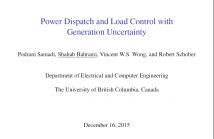
- Read more about Non-Intrusive Load Monitoring: A Power Consumption Based Relaxation
- Log in to post comments
Obtaining per-device energy consumption estimates in Non-Intrusive Load Monitoring (NILM) has proven to be a challenging task. We present Power Consumption Clustered Non-Intrusive Load Monitoring (PCC-NILM), a relaxation of the NILM problem that estimates the energy consumed by devices operating in different power ranges. The Approximate Power Trace Decomposition Algorithm (APTDA) is presented as an unsupervised, data-driven solution to the PCC-NILM problem.
- Categories:
 14 Views
14 Views- Read more about Placing and Sizing Distributed Photovoltaic Generators for Optimal Reactive Power Compensation
- Log in to post comments
A two-stage stochastic programming approach is pursued to optimally place and size photovoltaic (PV) inverters in a radial distribution network under solar irradiance and load uncertainties. First-stage variables include binary PV unit placement as well as continuous real and apparent power capacities of the inverters. Second-stage decisions comprise reactive power compensation, power flows, and nodal voltages, which are determined adaptively to the uncertainty. The objective is to minimize installation cost and expected thermal losses on the network.
- Categories:
 21 Views
21 Views- Read more about Optimal Scheduling of Networked Energy Storages
- Log in to post comments
Presentation.pdf
- Categories:
 15 Views
15 Views
In this paper, we focus on the problem of joint load scheduling and generation management to better match supply and demand. We formulate an optimization problem to jointly minimize the generation cost and discomfort cost of the users subject to the voltage and power balance equations for the equivalent circuit of the power system. The optimal power flow (OPF) equations are solved using semidefinite programming (SDP) relaxation technique. In our system model, we assume that users can exploit renewable energy resources (RERs).
Present.pdf
- Categories:
 26 Views
26 Views- Read more about Placing and Sizing Distributed Photovoltaic Generators for Optimal Reactive Power Compensation
- Log in to post comments
- Categories:
 13 Views
13 Views- Read more about A New Unsupervised Event Detector for Non-Intrusive Load Monitoring
- Log in to post comments
- Categories:
 12 Views
12 Views- Read more about Toward a Semi-Supervised Non-Intrusive Load Monitoring System for Event-based Energy Disaggregation
- Log in to post comments
GlobalSIP1501
- Categories:
 8 Views
8 Views- Read more about Microgrid Dispatch and Price of Reliability using Stochastic Approximation
- Log in to post comments
When properly operated, microgrids can facilitate the integration of stochastic renewable energy without compromising service reliability. However, in the context of multi-stage dispatching, finding the optimal day-ahead energy procurement that accounts for the variability of real-time operation is a computationally challenging task. This paper develops a computationally efficient two-stage economic dispatch scheme for a microgrid that exchanges energy with an external power system.
presentation.pdf
- Categories:
 8 Views
8 Views- Read more about Data-Driven Cyber-Physical Detection and Defense Strategy Against Data Integrity Attacks in Smart Grid Systems
- Log in to post comments
- Categories:
 13 Views
13 Views